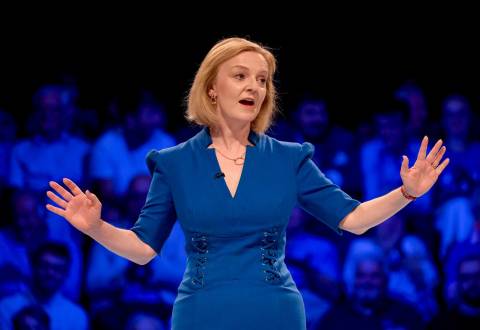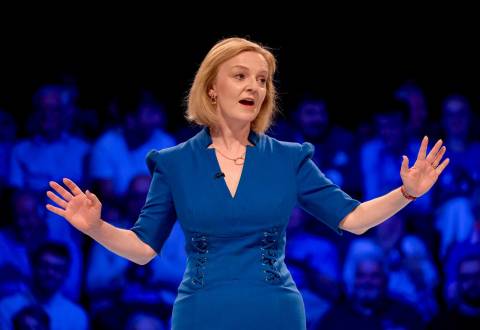(Bloomberg) --

Liz Truss ditched her plan to align UK public sector pay to regional living costs following a furious backlash from Conservative MPs who said it reneged on the party’s electoral promise to level up economic opportunity nationwide.

The foreign secretary, the front-runner in the race with Rishi Sunak to become the next prime minister, had announced the proposal late on Monday, saying it could save as much as £8.8 billion ($10.8 billion) a year. But following intense Tory criticism, her campaign team on Tuesday put out a statement saying there had been a “willful misrepresentation” of the plan.
“There will be no proposal taken forward on regional pay boards for civil servants or public sector workers,” Truss’s campaign said. “Current levels of public sector pay will absolutely be maintained.”
The U-turn by Truss less than 24 hours after announcing the policy may damage her standing in the contest to succeed Boris Johnson. The plan announced on Monday pledged to set up “regional pay boards” to adjust officials’ pay to ensure it “accurately reflects where they work.”
That drew sharp criticism from regional Conservative politicians who accused Truss of undermining government promises to raise living standards outside of London and the southeast because the plan suggested pay may be restrained in areas where the cost of living is lower.
‘Terrible Idea’
Steve Double, an MP representing a district in southwestern England, tweeted that it was a “terrible idea” and “hugely damaging to public services in Cornwall” where he said the National Health Service already struggles to recruit staff. Another MP from the region, Gary Streeter, called Truss’s proposals “disastrous,” while James Cartlidge, who represents a constituency in eastern England, questioned whether it meant police officers and the military in his area would earn less than those in London.
Ben Houchen, the Tory Tees Valley mayor, who is supporting Truss’s rival Rishi Sunak, said he was “speechless” at the plan.
The unforced error was earlier seized on by Truss’s rival, Sunak, whose team suggested that the proposal would entail cuts to salaries of nurses, police officers and the armed forces. Truss’s team countered in its statement that it was “simply wrong” to suggest she was going to cut public sector pay. The Sunak camp hit back, saying Truss had called for the plan as far back as 2018.
There were already signs the policy was evolving before its announcement late Monday, as the Truss campaign emailed two versions of its embargoed press release. The second one made changes including clarifying that the policy would apply only to new contracts and would be carried out in consultation with unions and workers. It also said the estimated savings applied only if the system were adopted “in the long term” for all public sector workers.
The opposition Labour Party said Truss’s pledge would take billions out of pay-packets in the North and Midlands, hitting local economies and high streets. It estimated that the South West would see the biggest individual hit, with £939 million taken out of the local economy.
‘Leveling Down’
“If Liz Truss is handed the keys to Number 10, workers outside the M25 will see their pay leveled down as she kicks out the ladder,” Labour’s deputy leader, Angela Rayner, said in a statement, referring to the motorway encircling London. “The Conservatives’ commitment to leveling up is dead on arrival” if Truss becomes premier.
The proposal on pay made up the biggest chunk of a wider plan to slash “waste, bureaucracy and inefficiency” that Truss said would ultimately save £11 billion a year. Other measures included plans to slash holiday allowances and cut diversity officers in the civil service.
Amid the growing threat of strikes by professions including teachers and doctors, she also unveiled plans to eliminate provisions that mean taxpayers pay for public sector workers to take time off in order to engage in official trade union activities, including organizing strikes. She estimated the ban on “facility time” will save as much as £137 million a year.
The anti-waste measures were designed to shore up her support on the right of the ruling Conservative Party as ballot papers went out to some 175,000 party members on Monday. She’s vying with Sunak for their votes, and has presented herself as the low-tax candidate who’ll challenge the “orthodoxy” within the civil service, in particular the Treasury.
Truss has led in polling of the Tory members who’ll pick the winner as well as among wider Conservative supporters, with her plan for immediate tax cuts cutting through with the party faithful.
While her campaign won a boost late on Monday when she received the endorsement of former leadership rival Penny Mordaunt, Sunak also had a fillip when a Techne poll suggested the gap may be narrowing with Truss. The survey of Conservative supporters put Truss on 48% and the former chancellor on 43%. While he’s still trailing, it’s a marked improvement on a previous survey by YouGov -- specifically among Tory Party members -- that gave the foreign secretary a 24-point lead.
(Updates with details, context, starting in eighth paragraph.)
More stories like this are available on bloomberg.com
©2022 Bloomberg L.P.
Author: Kitty Donaldson and Liza Tetley
